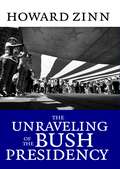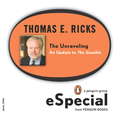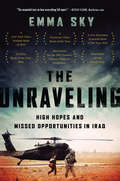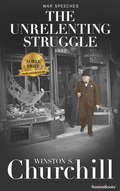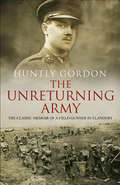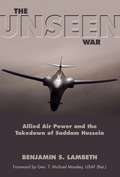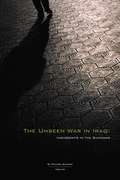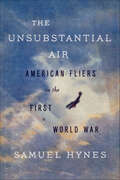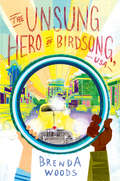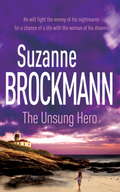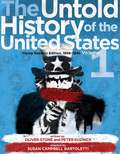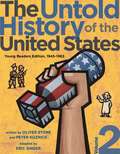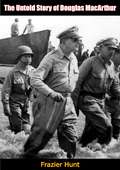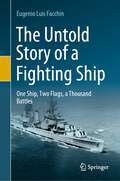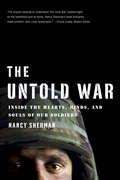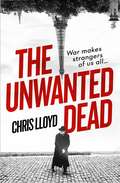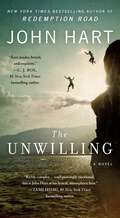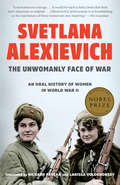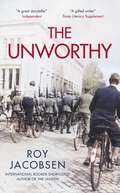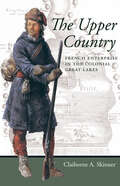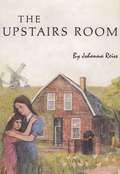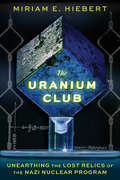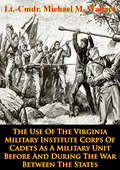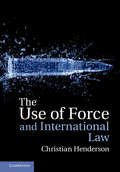- Table View
- List View
The Unraveling of the Bush Presidency
by Howard ZinnHere, in the magisterial yet plain-spoken style of A People's History of the United States, is historian Howard Zinn's long-awaited telling of these last six years of United States history, a time when catastrophic machinations of war have dictated our foreign and domestic policy, and when voices of resistance have appeared in the unlikeliest places.Perhaps more than any other American, Howard Zinn has helped us understand ourselves by deepening our understanding of our own history.
The Unraveling: An Update to The Gamble
by Thomas E. RicksIn this timely supplement to his 2009 New York Times bestseller The Gamble, Thomas E. Ricks reveals how the Iraq war has changed and how the national conversation has shifted since the time of writing. This Penguin eSpecial offers new insights into the difficulties likely to confront the United States in Iraq in the coming year, from our most trusted expert on the conflict there.
The Unraveling: High Hopes and Missed Opportunities in Iraq
by Emma SkyWhen Emma Sky, an intrepid young British woman, volunteered to help rebuild Iraq after the overthrow of Saddam Hussein, she had little idea what she was letting herself in for: a tour that would last over a decade, longer than that of any senior military of political official. As the only adviser to the Coalition Provisional Authority in Kirkuk and the closest confidante to U. S. General Odierno, Sky was valued for her controversial voice and outsider’s point of view--during the most painful stages of the war, she was one of the few to develop friendships and relationships with both Iraqis and Americans alike. In the West, violence in Iraq is typically explained away as the symptom of psychopathic terrorists, blurring and arbitrary colonial borders, and ancient hatreds between Sunni and Shia. But the violence stems from weak governance and corrupt elites, empowered by the U. S. -led coalition, who use sectarianism to mobilize support and fail to deliver service to the meet the needs of the country’s citizens. Women and men, Iraqis and Americans, soldiers and civilians, the ordinary and yet extraordinary, Western cultures and Eastern all collide in Iraq. Since the beginning of the invasion in 2003, Sky has been a tireless witness to American efforts to impose democracy on a country traumatized by decades of war and sanctions, newly liberated from the most brutal of regimes; the Iraqi who became insurgents and the insurgencies that morphed into civil war; the 2007 surge and then the drawdown of U. S. troops; the pitfalls and limitation of foreign powers; and the takeover by the Islamic State. A consummate insider, called the "modern-day Gertrude Bell” by the London Times, Sky provides insight into the ordered world of the US military, the complexities, diversity and evolution of Iraqi society during in the last ten years of uninterrupted conflict and the struggle to find stability in post-Saddam Iraq. With sharp detail, tremendous empathy and devotion to all those who served--The Unraveling is an intimate portrait of Americans who killed and cared, of friendships, humanity, the quest for peace and the failure of United States strategy.
The Unrelenting Struggle (Winston S. Churchill War Speeches #2)
by Winston S. ChurchillThis stunning second volume of wartime speeches and broadcasts from the Nobel Prize–winning prime minister captures the troubled early days of WWII. Legendary politician and military strategist Winston S. Churchill was a master not only of the battlefield, but of the page and the podium. Over the course of forty books and countless speeches, broadcasts, news items, and more, he addressed a country at war and at peace, thrilling with victory but uneasy with its shifting role on the world stage. In 1953, he was awarded the Nobel Prize for Literature for &“his mastery of historical and biographical description as well as for brilliant oratory in defending exalted human values.&” During his lifetime, he enthralled readers and brought crowds roaring to their feet; in the years since his death, his skilled writing has inspired generations of eager history buffs. This second volume in the series of the great orator&’s wartime speeches, broadcasts, public messages, and other communications take readers through the difficult years of 1940 to 1941. Faced with a challenging moment for the military as well as a groundswell of criticism from his government and his people, Churchill used his extraordinary command of language to inspire Britain to stand strong against Hitler and the growing Nazi threat. No fan of WWII military history should be without this extraordinary collection of seventy-two broadcasts, speeches, and messages to Parliament.
The Unreturning Army
by Huntly GordonIn the centenary year of the Great War, names such as Ypres, the Marne, the Somme, Passchendaele are heavy with meaning as settings for the near-destruction of a generation of men. It is this aura of tragedy that makes Huntly Gordon’s memoir, drawn from his letters written from the Front, such a potent one. He was sensitive, intelligent, unpretentious and, as his account reveals, capable of detached and trenchant judgement. As the summer of 1914 drew to a close, it was difficult for a16 year-old schoolboy to realize that the world for which he had been prepared at Clifton College was itself preparing for war. By 1916, he was commissioned in the Royal Field Artillery. By June 1917, he was at the Ypres Salient getting his ‘baptism’ at Hell Fire Corner in an intensive artillery duel that formed the prologue to Passchendaele itself. Early in 1918, his battery would fight a series of rearguard actions near Baupaume that would help turn the tide of the massive German Spring offensive. Huntly Gordon has given us an enduring and classic memoir: a poignant and extraordinarily human account of history as it happened.
The Unseen War
by Benjamin S. Benjamin LambethThe Unseen War offers a comprehensive assessment of the air contribution to the three weeks of major combat that ended the rule of Iraq's Saddam Hussein in 2003. Unlike in the earlier instance of Operation Desert Storm in 1991, the role of allied air power in the nation's second war against Iraq was not apparent to most observers, since the land offensive began concurrently with the air offensive and the overwhelming majority of the reporters who accompanied allied forces into combat were embedded with ground units. Even today, the air war history of Operation Iraqi Freedom remains largely unreported, despite the fact that American air assets, aided substantially by the air contributions of the United Kingdom and Australia, played a key role in enabling the prompt achievement of the coalition's immediate campaign goals. Lambeth's work fills a long-standing gap in the literature on modern warfare by telling that story of the role of airpower for the first time in the fullest detail.
The Unseen War in Iraq: Insurgents in the Shadows
by Richard SacconeWithout revealing classified methods that would undermine the CI effort, Dr. Saccone exposes the reader to the Unseen War in Iraq, a war of cloak-and-dagger and intrigue, a war interesting in its methods and critical to overall success. He reflects on his time spent at Abu Ghraib prison, raises thought-provoking questions relating to the difference between torture and coercive techniques, methods to distinguish between the “good guys” and the “bad guys” and provides deep insight into ways the military could improve their counterintelligence strategy.
The Unsubstantial Air: American Fliers in the First World War
by Samuel HynesThe vivid account of the young Americans who fought and died in the aerial battles of World War I, told in their own words.The Unsubstantial Air is the gripping story of the Americans who fought and died in the aerial battles of World War I. Much more than a traditional military history, it is an account of the excitement of becoming a pilot and flying in combat over the Western Front, told through the voices and words of the aviators themselves.A World War II pilot himself, the memoirist and critic Samuel Hynes revives the adventurous young men who inspired his own generation to take to the sky. By drawing on the letters sent home, diaries kept, and memoirs published in the years that followed, he brings to life their emotions, anxieties, and triumphs. They gasp in wonder at the world seen from a plane, struggle to keep their hands from freezing in open-air cockpits, party with actresses and aristocrats, rest of Voltaire’s castle, and search for their friends’ bodies on the battlefield. The young pilots’ romantic war becomes more than that—a harsh but often thrilling reality. Weaving together their testimonies, The Unsubstantial Air is a moving portrait of a generation coming of age under new and extreme circumstances.Praise for The Unsubstantial Air“Samuel Hynes is simultaneously a great gift to his complicated country and to our English language. He vividly brings to life our earliest air warriors and does so with a seemingly effortless but exhilarating prose that soars in much the same way his aviators do. Masterful.” —Ken Burns“A beautifully written evocation of the Ivy Leaguers, farm boys, and wild men who flew avions de chasse from (mainly) French airfields, based on their letters, flight diaries and memories.” —Roy Foster, The Times Literary Supplement Books of the Year (2014)
The Unsung Hero of Birdsong, USA
by Brenda WoodsThe Coretta Scott King Honor-winning author tells the moving story of the friendship between a young white boy and a Black WWII veteran who has recently returned to the unwelcoming Jim Crow South. <P><P>On Gabriel's twelfth birthday, he gets a new bike--and is so excited that he accidentally rides it right into the path of a car. Fortunately, a Black man named Meriwether pushes him out of the way just in time, and fixes his damaged bike. <P><P>As a thank you, Gabriel gets him a job at his dad's auto shop. Gabriel's dad hires him with some hesitation, however, anticipating trouble with the other mechanic, who makes no secret of his racist opinions. <P><P> Gabriel and Meriwether become friends, and Gabriel learns that Meriwether drove a tank in the Army's all-Black 761st Tank Battalion in WWII. Meriwether is proud of his service, but has to keep it a secret because talking about it could be dangerous. <P><P>Sadly, danger finds Meriwether, anyway, when his family receives a frightening threat. <P><P>The South being the way it is, there's no guarantee that the police will help--and Gabriel doesn't know what will happen if Meriwether feels forced to take the law into his own hands.
The Unsung Hero: Troubleshooters 1 (Troubleshooters #1)
by Suzanne BrockmannTroubleshooters: They Never Let You Down. The first addictive romantic suspense novel in New York Times bestselling author Suzanne Brockmann's Troubleshooters series, filled with thrilling adventure, excitement and passion. In THE UNSUNG HERO, Lieutenant Tom Paoletti faces a fight with the enemy of his nightmares if he is to have a chance of a life with the woman of his dreams, Kelly Ashton.After a near-fatal head injury, Navy SEAL Lieutenant Tom Paoletti is ordered to take a leave of absence from his team. Although it's the last thing he wants, Tom decides to make the best of a visit home to New England - and a chance to reconnect with childhood sweetheart Kelly Ashton. Kelly, now a doctor, has returned home to lick her wounds following a failed marriage but she has never forgotten Tom, the once infamous bad boy of the town. When Tom catches a terrifying glimpse of an international terrorist in their hometown, and the Navy dismisses the danger as injury-induced imaginings, Kelly is the one person who never doubts him. Creating his own makeshift counterterrorist team from his most loyal officers and the town's residents, Tom knows they must save the day if he is to have one last chance for happiness with Kelly...
The Untold History of the United States, Volume 1
by Susan Campbell Bartoletti Oliver Stone Peter KuznickA people's history of the American Empire, adapted for the next generation of young history buffs.There is history as we know it. And there is history we should have known. Adapted by Newbery Honor recipient Susan Campbell Bartoletti from the bestselling book (and companion to the Showtime documentary) The Untold History of the United States by Academy Award-winning director Oliver Stone and renowned historian Peter Kuznick, this first of four volumes presents young readers with a powerful and provocative look at the past century of American imperialism. This is not the kind of history taught in schools or normally presented on television or in popular movies. This riveting young readers' edition challenges prevailing orthodoxies to reveal the dark reality about the rise and fall of the American empire for curious, budding historians who are hungry for the truth. Based on the latest archival findings and recently declassified information, this four-volume series will come as a surprise to the vast majority of students and their teachers--and that's precisely why these books are such crucial counterpoints to today's history textbooks. Complete with photos, illustrations, and little-known documents, this first of four volumes covers crucial moments in American history from the late nineteenth century to the dropping of the atomic bomb on Hiroshima and Nagasaki.
The Untold History of the United States, Volume 2: Young Readers Edition, 1945-1962
by Oliver Stone Peter Kuznick Eric SingerRediscover pivotal moments in America’s past in this second volume of the young reader’s edition of The Untold History of the United States, from Academy Award–winning director Oliver Stone and Peter Kuznick. <P><P>There is history as we know it. And there is history we should have known. Complete with poignant photos and little-known but vitally important stories, this second of four volumes traces how people around the world responded to the United States’s rise as a superpower from the end of World War II through an increasingly tense Cold War and, eventually, to the brink of nuclear annihilation during the Cuban Missile Crisis. This is not the kind of history taught in schools or normally presented on television or in popular movies. This riveting young readers volume challenges prevailing orthodoxies to reveal uncomfortable realities about the US role in heightening Cold War tensions. It also humanizes the experiences of diverse people, at home and abroad, who yearned for a more just, equal, and compassionate world. This volume will come as a breath of fresh air for students, teachers, and budding young historians hungry for different perspectives—which makes it a crucial counterpoint to today’s history textbooks. <P><P>Adapted by high school and university educator Eric S. Singer from the bestselling book and companion to the documentary The Untold History of the United States by Academy Award–winning director Oliver Stone and renowned historian Peter Kuznick, this volume gives young readers a powerful and provocative look at the US role in the Cold War. It also provides a blueprint for those concerned with shaping a better and more equitable future for people across the world.
The Untold Story of Douglas MacArthur
by Frazier HuntFrazier Hunt’s friendship with Douglas MacArthur began on the battlefields of France during World War I. The young general, not quite six years the author’s senior, had already caught the allure of Pacific destiny by the time that Hunt made his first long trip to the Orient—Japan, Siberia, China, the Philippines, Australia, Southeast Asia, India. Both Hunt and MacArthur, from their separate viewpoints, early foresaw that America’s destiny lay in the Pacific.Hunt had the unique experience of covering for newspapers and magazines every war and revolution. Following four months at General MacArthur’s headquarters in New Guinea in 1944, he wrote MacArthur and the War Against Japan.The Untold Story of Douglas MacArthur was his fourteenth and final book. A fitting monument to an outstanding reporter.“Warmly written, argumentative, greatly detailed, yet fast moving...It is a racing, readable book.”—New York Times Book Review“This is a most unusual book—with its power and sweep and fierce passion for the truth. It is a book that every American should be interested in, the full-length story of the boy, the man, the General.”—The Army-Navy-Air Force Register“An important contribution to the history of the times.”—San Francisco Call-Bulletin“A thrilling biography. Frazier Hunt had a background of information and experience that better fitted him than any other to tell the intimate MacArthur story.”—Montgomery Advertiser“It is a skillful, objective study of a great man, documented to the nines, the product of highly disciplined research. It is honest biography...Anyone wishing to understand the things that moved and formed Douglas MacArthur will find most of the answers in this book.”—Cincinnati Enquirer
The Untold Story of a Fighting Ship: One Ship, Two Flags, a Thousand Battles
by Eugenio Luis FacchinThis book is an enthralling account of the role played by the destroyer ARA Bouchard in the Falklands/Malvinas War. Over forty years after its construction, with obsolete technology, scarce maintenance and many out-of-service machineries, it was still present during the whole campaign with a prominent role that, for several reasons, remained hidden until today. During the Falklands/Malvinas conflict, it patrolled the north of the archipelago to allow the recapture of the islands. It was noteworthy together with the Cruiser and another destroyer in the attack on the British fleet, without being able to find it. On its return, it was hit by the third torpedo launched by the submarine Conqueror aimed at the cruiser ARA General Belgrano. It suffered damage and, although it could still sail, was forced to dry dock to change a part of its hull. For two consecutive nights, it stopped British commandos from making an incursion into the Río Grande airport, in order to destroy the Navies Super Etendard attack aircraft and assassinate its pilots. With its main gun battery, it fired with combat ammunition on enemy targets and was the only main battery to have the opportunity to do so. It was irradiated and used for missile target practice; they were unable to sink it during the firing practice. Later, it was decommissioned and scrapped.
The Untold War: Inside the Hearts, Minds, and Souls of Our Soldiers
by Nancy Sherman"Brilliant . . . a must read for veterans and those who seek to understand them."--Huffington Post The Untold War draws on revealing interviews with servicemen and -women to offer keen psychological and philosophical insights into the experience of being a soldier. Bringing to light the ethical quandaries that soldiers face--torture, the thin line between fighters and civilians, and the anguish of killing even in a just war--Nancy Sherman opens our eyes to the fact that wars are fought internally as well as externally, enabling us to understand the emotional tolls that are so often overlooked.
The Unwanted Dead
by Chris Lloyd'A gripping murder mystery and a vivid recreation of Paris under German Occupation.' ANDREW TAYLOR'Terrific' SUNDAY TIMES, Best Books of the Month'A thoughtful, haunting thriller' MICK HERRON'Sharp and compelling' THE SUN* * * * *Paris, Friday 14th June 1940.The day the Nazis march into Paris, making headlines around the globe.Paris police detective Eddie Giral - a survivor of the last World War - watches helplessly on as his world changes forever.But there is something he still has control over. Finding whoever is responsible for the murder of four refugees. The unwanted dead, who no one wants to claim.To do so, he must tread carefully between the Occupation and the Resistance, between truth and lies, between the man he is and the man he was.All the while becoming whoever he must be to survive in this new and terrible order descending on his home...* * * * *'Lloyd's Second World War Paris is rougher than Alan Furst's, and Eddie Giral, his French detective, is way edgier than Philip Kerr's Bernie Gunther ... Ranks alongside both for its convincingly cloying atmosphere of a city subjugated to a foreign power, a plot that reaches across war-torn Europe and into the rifts in the Nazi factions, and a hero who tries to be a good man in a bad world. Powerful stuff.'THE TIMES'Excellent ... In Eddie Giral, Lloyd has created a character reminiscent of Philip Kerr's Bernie Gunther, oozing with attitude and a conflicted morality that powers a complex, polished plot. Historical crime at its finest.'VASEEM KHAN, author of Midnight at Malabar House'Monumentally impressive ... A truly wonderful book. If somebody'd given it to me and told me it was the latest Robert Harris, I wouldn't have been surprised. Eddie Giral is a wonderful creation.'ALIS HAWKINS'A terrific read - gripping and well-paced. The period atmosphere is excellent.'MARK ELLIS'The best kind of crime novel: gripping, thought-provoking and moving. In Detective Eddie Giral, Chris Lloyd has created a flawed hero not just for occupied Paris, but for our own times, too.'KATHERINE STANSFIELD
The Unwilling: A Novel
by John HartTHE INSTANT BESTSELLER“We the unwilling, led by the unqualified to kill the unfortunate, die for the ungrateful.” —Unknown SoldierSet in the South at the height of the Vietnam War, The Unwilling combines crime, suspense and searing glimpses into the human mind and soul in New York Times bestselling author John Hart's singular style. Gibby's older brothers have already been to war. One died there. The other came back misunderstood and hard, a decorated killer now freshly released from a three-year stint in prison. Jason won't speak of the war or of his time behind bars, but he wants a relationship with the younger brother he hasn't known for years. Determined to make that connection, he coaxes Gibby into a day at the lake: long hours of sunshine and whisky and older women. But the day turns ugly when the four encounter a prison transfer bus on a stretch of empty road. Beautiful but drunk, one of the women taunts the prisoners, leading to a riot on the bus. The woman finds it funny in the moment, but is savagely murdered soon after. Given his violent history, suspicion turns first to Jason; but when the second woman is kidnapped, the police suspect Gibby, too. Determined to prove Jason innocent, Gibby must avoid the cops and dive deep into his brother's hidden life, a dark world of heroin, guns and outlaw motorcycle gangs. What he discovers there is a truth more disturbing than he could have imagined: not just the identity of the killer and the reasons for Tyra's murder, but the forces that shaped his brother in Vietnam, the reason he was framed, and why the most dangerous man alive wants him back in prison. This is crime fiction at its most raw, an exploration of family and the past, of prison and war and the indelible marks they leave.
The Unwomanly Face of War: An Oral History of Women in World War II
by Larissa Volokhonsky Richard Pevear Svetlana AlexievichA long-awaited English translation of the groundbreaking oral history of women in World War II across Europe and Russia—from the winner of the Nobel Prize in Literature“A landmark.”—Timothy Snyder, author of On Tyranny: Twenty Lessons from the Twentieth CenturyFor more than three decades, Svetlana Alexievich has been the memory and conscience of the twentieth century. When the Swedish Academy awarded her the Nobel Prize, it cited her invention of “a new kind of literary genre,” describing her work as “a history of emotions . . . a history of the soul.” In The Unwomanly Face of War, Alexievich chronicles the experiences of the Soviet women who fought on the front lines, on the home front, and in the occupied territories. These women—more than a million in total—were nurses and doctors, pilots, tank drivers, machine-gunners, and snipers. They battled alongside men, and yet, after the victory, their efforts and sacrifices were forgotten. Alexievich traveled thousands of miles and visited more than a hundred towns to record these women’s stories. Together, this symphony of voices reveals a different aspect of the war—the everyday details of life in combat left out of the official histories. Translated by the renowned Richard Pevear and Larissa Volokhonsky, The Unwomanly Face of War is a powerful and poignant account of the central conflict of the twentieth century, a kaleidoscopic portrait of the human side of war.“But why? I asked myself more than once. Why, having stood up for and held their own place in a once absolutely male world, have women not stood up for their history? Their words and feelings? They did not believe themselves. A whole world is hidden from us. Their war remains unknown . . . I want to write the history of that war. A women’s history.”—Svetlana Alexievich THE WINNER OF THE NOBEL PRIZE IN LITERATURE “for her polyphonic writings, a monument to suffering and courage in our time.”“Reveals the harrowing, brave, and even quotidian memories of Soviet women whose voices were nearly stifled by the mores of history. These accounts fight our ingrained ideas about what makes a war story.”—Sloane Crosley, Vanity Fair “Groundbreaking . . . a mosaic of Russian women’s stories—from the home front to the front lines, from foot soldiers to cryptographers to antiaircraft commanders.”—Elle
The Unworthy
by Roy Jacobsen"Jacobsen can make almost anything catch the light . . . One of Norway's greatest writers on the working class" Times Literary SupplementThey're a gang without a name - Olav, Carl, Roar, Jan and Vidar - teenage boys growing up in a working-class area of Oslo under the shadow of Nazi occupation. They live in poverty but earn a crust by creatively swindling their fellow citizens, falsifying documents and stealing like magpies. And they don't shy away from targeting the Enemy, either.But everything changes when Carl's father hands him a secret map and a German password, just hours before he's taken away by the Quisling police - only to return in a coffin. And when Olav's father also disappears, the gang come to see that they are caught up in something far more serious than their usual petty crimes.Taking in love, death, betrayal and tragedy, The Unworthy is the latest masterpiece from Roy Jacobsen, author of the International Booker-shortlisted The Unseen. It shines a light on a brutal aspect of the war rarely explored in fiction, and every sentence is imbued with decades of accumulated wisdom from a writer who had his own brushes with the law in his youth.Translated from the Norwegian by Don Bartlett and Don Shaw
The Unworthy
by Roy Jacobsen"Jacobsen can make almost anything catch the light . . . One of Norway's greatest writers on the working class" Times Literary SupplementThey're a gang without a name - Olav, Carl, Roar, Jan and Vidar - teenage boys growing up in a working-class area of Oslo under the shadow of Nazi occupation. They live in poverty but earn a crust by creatively swindling their fellow citizens, falsifying documents and stealing like magpies. And they don't shy away from targeting the Enemy, either.But everything changes when Carl's father hands him a secret map and a German password, just hours before he's taken away by the Quisling police - only to return in a coffin. And when Olav's father also disappears, the gang come to see that they are caught up in something far more serious than their usual petty crimes.Taking in love, death, betrayal and tragedy, The Unworthy is the latest masterpiece from Roy Jacobsen, author of the International Booker-shortlisted The Unseen. It shines a light on a brutal aspect of the war rarely explored in fiction, and every sentence is imbued with decades of accumulated wisdom from a writer who had his own brushes with the law in his youth.Translated from the Norwegian by Don Bartlett and Don Shaw
The Upper Country: French Enterprise in the Colonial Great Lakes (Regional Perspectives on Early America)
by Claiborne A. SkinnerThe Upper Country melds myth and conventional history to provide a memorable tale of French designs in the middle of what became the United States. Putting the reader on the battlefields, at the trading posts, and on the rivers with voyageurs and their allies from the Indian nations, Claiborne Skinner reveals the saintly missionaries and jolly fur traders of popular myth as agents of a hard-nosed, often ruthless, imperial endeavor. Skinner’s engaging narrative takes the reader through daily life at posts like Forts Saint Louis and Michilimakinac, illuminates the complexities of interracial marriage with the courtship of Michel Aco at Peoria, and explains how France's New World adventurism played a role in the outbreak of the Seven Years War and the beginning of the modern era.In this story, many of the traditional heroes and villains of American history take on surprising roles. The last Stuart kings of England seem shrewd and even human; George Washington makes his debut appearance on the stage of history by assassinating a French officer and plunging Europe into the first truly global war. From unthinkable hardship to dreams of fur trade profits, this fascinating exploration sheds new light on France and its imperial venture into the Great Lakes.
The Upstairs Room
by Johanna ReissA Life in Hiding<P><P> When the German army occupied Holland, Annie de Leeuw was eight years old. Because she was Jewish, the occupation put her in grave danger-she knew that to stay alive she would have to hide. Fortunately, a Gentile family, the Oostervelds, offered to help. For two years they hid Annie and her sister, Sini, in the cramped upstairs room of their farmhouse.<P> Most people thought the war wouldn't last long. But for Annie and Sini -- separated from their family and confined to one tiny room -- the war seemed to go on forever. <P> In the part of the marketplace where flowers had been sold twice a week-tulips in the spring, roses in the summer-stood German tanks and German soldiers. Annie de Leeuw was eight years old in 1940 when the Germans attacked Holland and marched into the town of Winterswijk where she lived. Annie was ten when, because she was Jewish and in great danger of being captured by the invaders, she and her sister Sini had to leave their father, mother, and older sister Rachel to go into hiding in the upstairs room of a remote farmhouse.<P> Johanna de Leeuw Reiss has written a remarkably fresh and moving account of her own experiences as a young girl during World War II. Like many adults she was innocent of the German plans for Jews, and she might have gone to a labor camp as scores of families did. "It won't be for long and the Germans have told us we'll be treated well," those families said. "What can happen?" They did not know, and they could not imagine.... But millions of Jews found out.<P> Mrs. Reiss's picture of the Oosterveld family with whom she lived, and of Annie and Sini, reflects a deep spirit of optimism, a faith in the ingenuity, backbone, and even humor with which ordinary human beings meet extraordinary challenges. In the steady, matter-of-fact, day-by-day courage they all showed lies a profound strength that transcends the horrors of the long and frightening war. Here is a memorable book, one that will be read and reread for years to come.<P> Newbery Medal Honor book<P><P> Jane Addams Children’s Book Honor Book
The Uranium Club: Unearthing the Lost Relics of the Nazi Nuclear Program
by Miriam E Hiebert Timothy W Koeth"Much as Marcel Proust spun out a lifetime of memories from the taste of a madeleine, The Uranium Club spins out the history of Nazi Germany's failed World War II atomic-bomb project by tracing the whereabouts of a small, blackened cube of Nazi uranium. It's a riveting tale of competing German ambitions and arrogant mistakes, a nonfiction thriller tracking teams of American scientists as they race to prevent Hitler from beating the United States to the atomic bomb." —Richard Rhodes, author of The Making of the Atomic BombTim Koeth peered into the crumpled brown paper lunch bag; inside was a surprisingly heavy black metal cube. He recognized the mysterious object instantly—he had one just like it sitting on his desk at home. It was uranium metal, taken from the nuclear reactor that Nazi scientists had tried—and failed—to build at the end of World War II. This unexpected gift, wrapped in a piece of paper inscribed with a few cryptic but crucial lines, would launch Koeth, a nuclear physicist and professor, and his colleague Miriam Hiebert, a cultural heritage scientist, on an odyssey to trace the tale of these cubes—two of the original 664 on which the Third Reich had pinned their nuclear ambitions. Part treasure hunt, part historical narrative, The Uranium Club winds its way through the back doors of World War II and Manhattan Project histories to recount the contributions of the men and women at the forefront of the race for nuclear power. From Werner Heisenberg and Germany's nuclear program to the Curies, the first family of nuclear physics, to the Allied Alsos Mission's infiltration of Germany to capture Nazi science to the renegade geologists of Murray Hill scouring the globe for uranium, the cubes are lodestars that illuminate a little-known—and hugely consequential—chapter of history.The cubes are physical testimony to the stories of the German failure, and the successful American program that launched the world into the modern nuclear age, and the lessons for modern science that the contrast in these two programs has to offer.
The Use Of The Virginia Military Institute Corps Of Cadets As A Military Unit: Before And During The War Between The States
by Lt.-Cmdr. Michael M. WallaceDuring the Civil War, the Confederate government passed legislation creating a national military academy and establishing the rank of Cadet. The national military college was unnecessary because the Confederacy already possessed numerous state military colleges However, the Confederate government failed to properly engage these individual state schools by providing curriculum recommendations or commissioning their graduates. This shortsighted and domineering attitude by the Confederate government ensured that the military colleges failed in their mission to produce a large number of officers for the Confederate army.It was the state governments (especially Virginia and South Carolina), not the Confederacy, that realized the importance that military colleges in the Confederacy and kept them operating with very little Confederate support. Virginia made a conscious decision to keep VMI open, not as a short term "officer candidate school," but with her four-year military and academic curriculum intact. Supporting the school both militarily and financially, VMI produced the most officers of the southern military colleges for service in the Confederate army. Additionally, the cadets themselves were used as a military unit by the Confederate and state governments numerous times in the war.
The Use of Force and International Law: The Impact Of The United States Upon The Jus Ad Bellum In The Post-cold War Era (The\ashgate International Law Ser.)
by Christian HendersonThe Use of Force and International Law offers an authoritative overview of international law governing the resort to force. Looking through the prism of the contemporary challenges that this area of international law faces, including technology, sovereignty, actors, compliance and enforcement, this book addresses key aspects of international law in this area: the general breadth and scope of the prohibition of force, what is meant by 'force', the use of force through the UN and regional organisations, the use of force in peacekeeping operations, the right of self-defence and the customary limitations upon this right, forcible intervention in civil conflicts, the controversial doctrine of humanitarian intervention. <P><P>Suitable for advanced undergraduate and postgraduate students, academics and practitioners, The Use of Force and International Law offers a contemporary, comprehensive and accessible treatment of the subject. Follows a clear and accessible structure to better support lecturers teach their courses and aid student understanding.<P> Clearly lays out the distinction between concepts and terms to enable students to grasp the fundamental distinctions before delving deeper into the subject.<P> Comprehensive references to primary and secondary sources support student understanding of the breadth of legal resources in the field and aid further research.
